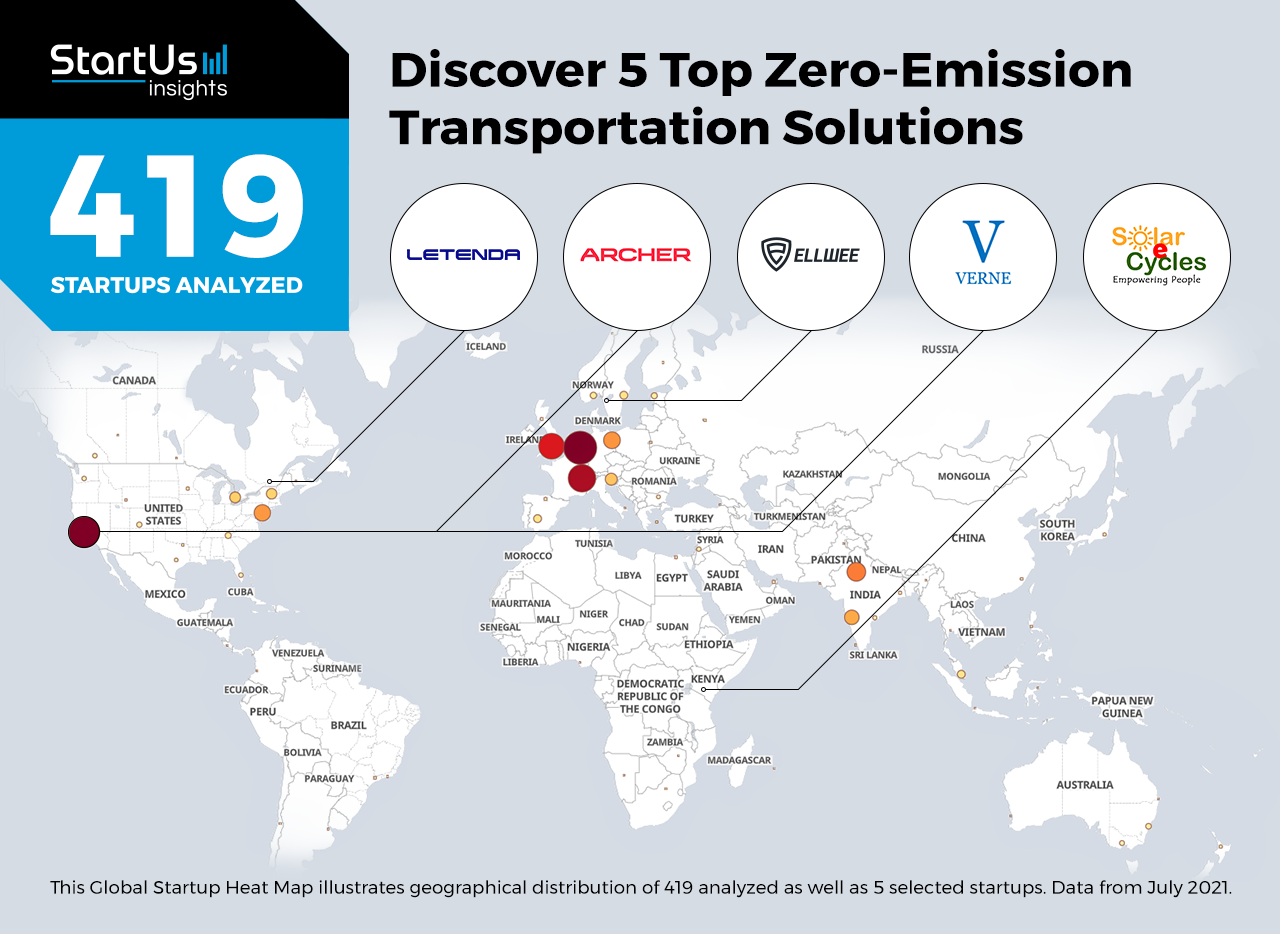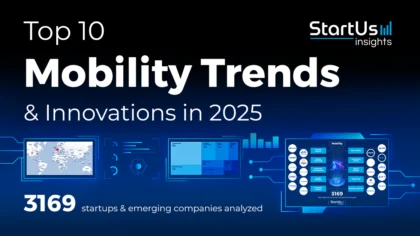Staying ahead of the technology curve means strengthening your competitive advantage. That is why we give you data-driven innovation insights into the mobility industry. This time, you get to discover 5 hand-picked startups working on zero-emission transportation solutions.
Global Startup Heat Map highlights 5 Top Zero-Emission Transportation Solutions out of 419
The insights of this data-driven analysis are derived from the Big Data & Artificial Intelligence-powered StartUs Insights Discovery Platform, covering 2.093.000+ startups & scaleups globally. The platform gives you an exhaustive overview of emerging technologies & relevant startups within a specific field in just a few clicks.
The Global Startup Heat Map below reveals the distribution of the 419 exemplary startups & scaleups we analyzed for this research. Further, it highlights 5 mobility startups that we hand-picked based on criteria such as founding year, location, funding raised, and more. You get to explore the solutions of these 5 startups & scaleups in this report. For insights on the other 414 zero-emission transportation solutions, get in touch.
Solar E-Cycles develops Light Electric Vehicles
Currently, most personal vehicles run on fossil fuels making them key contributors to increasing greenhouse gas emissions. However, many alternative solutions such as fuel cells, and biodiesel-based vehicles are costly and have other limitations like carrying capacity and power availability. That is why startups are developing affordable, clean, and zero-emission light electric vehicles and hybrid fuel systems that are easier to adopt.
Kenyan startup Solar E-Cycles provides a solar-powered micromobility solution. The startup’s hybrid solar-powered e-Cycle runs on solar energy stored in batteries and is recharged via the EV charging network. Additionally, the bicycle has pedals in case of energy shortage or emergencies. The e-Cycle is a noiseless, emission-free mobility solution that has a range of 50-100 km per day with a speed of 25-45 kph. Moreover, it stores the excess energy in batteries, capable of storing 1.500 to 6.000 Wh, for Vehicle-to-Grid (V2G) applications.
Archer advances Urban Air Mobility (UAM)
The aviation sector is a substantial contributor to methane and other greenhouse gas emissions. Still, there is a growing demand for scaling up urban air mobility for cargo and passengers. However, due to sustainability concerns, there is an active need for cleaner alternatives in air mobility. This is why mobility startups are innovating in regards to designs, fuel systems, and materials to advance sustainable air mobility.
US-based startup Archer works on advanced urban air mobility solutions. The startup utilizes computational fluid dynamics to simulate the aerodynamics of electric aircraft. Meru, the startup’s zero-emission lithium-based battery system, provides 74 KWh energy and cell voltage up to 4.4 V. The startup also offers proprietary data-tracking software that aids in determining trip locations, cost, and user experience.
Legenda builds a Zero-Emission Electric Bus
The most populated countries in the world are mostly composed of lower and middle-income populations, where the adoption of advanced micromobility solutions has a very slim chance. Thus, CleanEch innovations for public transport accelerate the replacement of fossil-fueled buses through zero-emission solutions.
Canadian startup Letenda offers Electrip, a 9 meter-long bus model with an electric propulsion system. The startup’s low-cost solution offers an alternative to diesel-powered buses that also provides a higher operating range. Letenda’s rear-axle steering increases the vehicle’s maneuverability and the startup’s buses also feature high-energy efficiency systems and effective thermal insulation.
Verne works on High-Density Hydrogen Storage
Freight transport with heavy-duty vehicles such as trucks and ships plays a major role in global trade. To address the carbon footprint of this transportation mode, companies are advancing CleanTech solutions including hydrogen fuel. Therefore, many hydrogen fuel-based mobility systems are blooming in the market, however, a potential solution needs to be efficient in storage capacity, cost-effective, and reduced weight.
US-based startup Verne develops high-density hydrogen storage systems for zero-emission. The startup’s storage solution is lightweight and is built for trucks as their low-pressure system is safe and reliable for use in heavy-duty vehicles. Additionally, the system provides two times the volumetric density of a truck and cheaper tanks for storage. Verne’s emission-free mobility solution is set to be deployed and tested in trucks, followed by large ships and airlines to effectively achieve emission-free mobility.
Ellwee creates a Versatile Electric Vehicle
Electric vehicles offer sustainable and zero-emission mobility by replacing conventional fossil fuel and gas-powered vehicles with battery-powered propulsion systems. The increased use of EVs for micromobility enables a massive reduction in methane and carbon dioxide emissions. However, most EVs in the market offer low carrying capacity limiting their wider adoption. Mobility startups offer electric vehicles with more accommodating designs, versatility, and the ability to ride on damaged roads.
Swedish startup Ellwee designs and manufactures lightweight, affordable, multi-purpose four-wheeled EVs for daily transportation. The startup’s Ellwee X is a highly efficient and customizable EV. Ellwee X offers a 25 km per hour speed, and a range of 65 km when fully charged. The engine capacity is 1.500 watts, making the startup’s eco-friendly vehicle suited for adventurous rides.
Discover more Mobility Startups
Mobility startups such as the examples highlighted in this report focus on the Internet of Things, Electrification, Smart Infrastructure as well as Micromobility. While all of these technologies play a major role in advancing the mobility industry, they only represent the tip of the iceberg. To explore more mobility technologies, simply get in touch to let us look into your areas of interest. For a more general overview, you can download our free Mobility Innovation Report to save your time and improve strategic decision-making.









